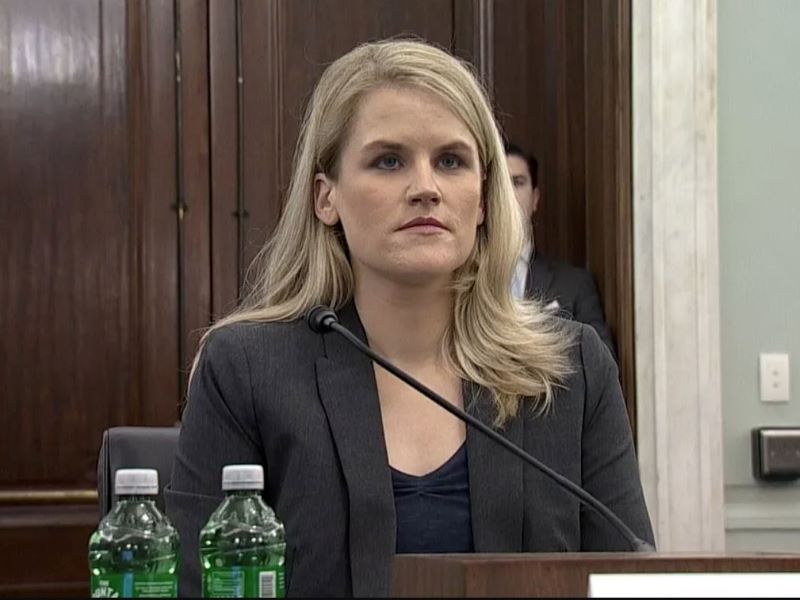The whistleblower who testified to US congress earlier this month that Facebook is putting “profits before people” has urged Australian politicians to regulate the tech giant because it has even less incentive to clean up its act in the smaller market.
In a briefing organised by Liberal MP Julian Simmonds and digital rights group Reset Australia, former Facebook executive Frances Haugen urged a group of parliamentarians to stop putting faith in Facebook to do the right thing on its own, and urgently develop regulations that would bring genuine oversight to its platforms.

“Stop trusting Facebook,” Ms Haugen told a group of parliamentarians including the Coalition’s Anne Webster and Nola Marino and Labor’s Bill Shorten and Tim Watts.
“The question of democracies being endangered is a real, real question.”
Earlier this month, Ms Haugen told US lawmakers that Facebook’s leadership team knew how to make the company’s platforms safer but was refusing to make the changes because it would harm its “immense profits”.
It followed an investigation by the Wall Street Journal based on leaked internal documents that showed Facebook’s platforms are “riddled with flaws that cause harm, often in ways only the company fully understands”.
The failure to act comes despite Facebook repeatedly pledging to clean up misinformation and polarisation on its platforms, and independent oversight is now needed, Ms Haugen told Australian MPs on Thursday.
The US whistleblower urged the group to consider making Facebook provide Australian users and policymakers with access to some of the data held by the tech giant and transparency on how it is being used, particularly in around issues like the pandemic and the upcoming federal election.
“I guarantee you, Australia is not a top priority [to Facebook],” Ms Haugen said. “There is no way that Facebook can act in a safe way globally, without sharing data. There’s no way smaller countries are going to be able to kept safe, unless they can access their data.”
The Australian briefing was part of the whistleblower’s world tour to speak with lawmakers about the threat of Facebook. The local stop, held virtually, was organised by Queensland Liberal MP Julian Simmonds and Reset Australia, the Australian arm of a global organisation working against digital threats to democracy.
Reset Australia asked Ms Haguen to speak with Australian politicians because of her ability to articulate the conflicts and trade-offs that come with the big tech business model, where user wellbeing is often sacrificed for their “engagement” and the advertising dollars that follow.
Reset Australia’s director of tech policy Dhakshayini Sooriyakumaran told InnovationAus Australian lawmakers are well aware of the business model and the challenges it creates, and that the briefing was well received across the political aisle.
“[Australian] lawmakers understand it,” she said.
“I think there’s just a genuine challenge in then addressing it through regulatory interventions, because of the vast scale [and] the complexity.”
Both Labor and Coalition politicians responded positively to the briefing, according to Ms Sooriyakumaran.
“It seems to be something that, regardless of where you are on the political spectrum, constituents are going to be asking questions around these kinds of things and have concerns around these kinds of things,” she said.
In Australia, Facebok and other platform giants have agreed to the voluntary Australian Code of Practice on Disinformation and Misinformation, which they developed amid growing scrutiny of the companies, and have established an independent complaints committee.
But the moves have been widely criticised for being inadequate, including lacking enforcement powers.
Ms Sooriyakumaran, also an ANU PhD candidate and former human rights director of the Australasian Centre for Corporate Responsibility, said it was incumbent on Australian politicians to consider regulatory action beyond.
She said the intervention should go beyond content moderation, with measures that address the platform’s algorithms and how they amplify content.
“The visibility of the content, that’s what we see when we’re scrolling through platforms. But actually it’s the algorithms and the multiple decisions that Facebook and other social media companies have made in creating those algorithms that actually leads to the content that we see.”
Do you know more? Contact James Riley via Email.

